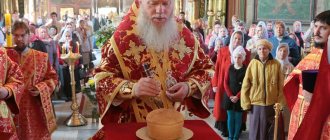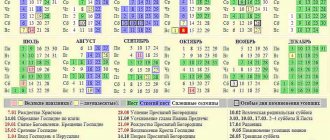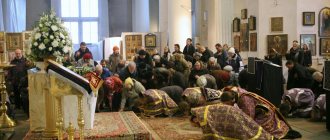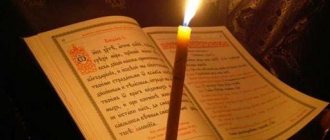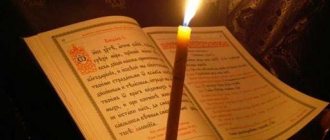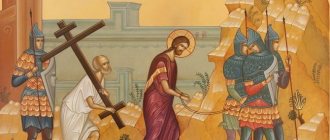Let it be known to you about this, priest: when the holiday is celebrated, do not say the verbs of the day, or on the feast of the Mother of God, do not say in it: Christ our True God, through the prayers of His Most Pure Mother, honorable Ago and glorious Nativity, or Assumption, or Introduction, and other feasts of Her: or St. John the Baptist, the Nativity, or the Beheading, and other saints in memory or their repose, or the discovery, and the transfer of relics. But here are the verbs, like the feast of the Mother of God, the Nativity of Her, or the Assumption, and others:
Christ our True God, through the prayers of His Most Pure Mother and all the saints, will have mercy and save us, as He is Good and Lover of Mankind.
The same short holiday holiday on the feasts of saints “with vigil”:
- Holy Apostle and Evangelist John the Theologian - September 26,
- St. John Chrysostom - November 13,
- Venerable Savva the Sanctified – December 5,
- St. Nicholas the Wonderworker - December 6,
- St. Anthony the Great - January 17 (conventionally - “if the abbot pleases, we hold a vigil”),
- St. Euthymius the Great - January 20 (also conditional),
- Three saints - Basil the Great, Gregory the Theologian and John Chrysostom - January 30,
- Holy Great Martyr and Victorious George - April 23,
- Holy Apostle and Evangelist John the Theologian - May 8,
- Saints Equal to the Apostles Cyril and Methodius - May 11,
- Nativity of St. John the Baptist - June 24,
- Holy Chief Apostles Peter and Paul - June 29,
- Beheading of the Baptist of the Lord John - August 29.
And also the saint: Christ our true God, through the prayers of His Most Pure Mother, and the holy apostle, [or saint, or martyr] name, and all the saints: and so on to the end.
For now, not the Nativity of the Mother of God, below the Introduction, or the Dormition of Her, we strive to God for prayer, but the Most Holy Theotokos herself: so, neither the memory nor the repose of the saints, we bring to prayer you to God, but among them.
Sunday holiday:
Risen from the dead, Christ our True God, through the prayers of His Most Pure Mother and all the saints, will have mercy and save us, for He is Good and Lover of Mankind.
Vacation for the Orthodox
Every Orthodox service ends with dismissal. The short priestly prayer contains glorification and mention of the celebration of a religious event or holy person on this day. At the end of the holiday, the priest wishes peace and blesses those praying by kissing the hand or cross. The tradition of reading absolution began in the 2nd century; the holy martyr Martial is considered its founder.
Theologians attach ideological significance to the final prayer. It is compared to the nightly struggle of the Old Testament Jacob with God, after which he asked God for blessings. This struggle and blessing changed the cunning and crafty Jacob, whose name after this became Israel. Likewise, believers, after fervent prayers to the Lord, should not leave the temple without receiving God’s blessing in the form of dismissal. This is as important to them as it was to Jacob. A blessing through the lips of a priest on behalf of God means spiritual cleansing and drawing closer to the Lord.
The parting prayer is performed by the priest when he stands in the Royal Doors facing the flock.
In Orthodoxy, several standard abjects are used:
- Small. Little Vespers, Compline, Midnight Office, and the Hours are said: “Christ our true God, through the prayers of His Most Pure Mother, our reverend and God-bearing Fathers and all the saints, will have mercy and save us as He is good and Lover of Mankind.”
- Great (daytime). At daily and great vespers, matins, and liturgy they read: “Christ our true God, through the prayers of His Most Pure Mother, the glorious and all-praised apostles (...), our reverend and God-bearing fathers and all the saints, will have mercy and save us, as He is good and a lover of mankind.”
- Holidays. On the twelve holidays and on Sundays they read depending on the holiday. For example, at Christmas: “Who was born in a den and reclined in our manger for salvation, Christ our true God...”. On Trinity: “Who in the form of fire sent down from heaven the Holy Spirit upon his holy disciples and Apostles, Christ our true God...” On Sunday: “Christ our true God has risen from the dead...” They are divided into full and short.
- Passionate. Reminds me of holidays. On each day of Holy Week, the corresponding day of the earthly life of Jesus Christ is remembered. For example, on Good Friday: “Who endured spitting and beating, strangulation and the cross and death for the salvation of the world, Christ our True God...”. On Holy Saturday they read the Great Dismissal.
The great and festive holidays end with the singing of the choir “Many Years” to the Patriarch of Moscow and All Rus', the Metropolitan/Archbishop, the clergy of the temple and all Orthodox Christians.
Dismissals of the Bishop's holidays according to order
Glagolemies in Vespers, Matins, and in the Liturgy according to the order:
Feast of the Universal Exaltation of the Holy Cross:
Christ, our true God, through the prayers of His Most Pure Mother, by the power of the Honest and Life-Giving Cross and all the saints, will have mercy and save us, as He is Good and Lover of Mankind.
on the days of after-feast:
Christ, our true God, through the prayers of His Most Pure Mother, by the power of the Honest and Life-Giving Cross, like the saints of our father John, Archbishop of Constantine, Chrysostom, [the saint whose temple is, and the holy one who is the day:] and all holy oh, have mercy and He will save us, as He is Good and Lover of Mankind.
On Christmas Day:
Also, in the vertebrae is born, and in the leaf, the rejoicing of the rescue, Christ, is the prayer of our mere mere mere, and all the saints, and save us, I am the blessings and humanolus.
For Circumcision:
And on this day, Christ our True God was willing to be circumcised in the flesh, for our salvation, through the prayers of His Most Pure Mother, also in the saints of our father Basil the Great, Archbishop Caesarea of Cappadocia, which we commemorate today, and all the saints, will have mercy and save us, for Good and Lover of Humanity
On Epiphany:
And in the Jordan, he was baptized from Joanne, who was happy with the rescue, Christ’s and our godly god, prayers of his praying Mater, and all the saints, and save us, I am the benefit and humanolus.
Cathedral of the Baptist and Baptist John:
And in the Jordan you were willing to be baptized by John, for our salvation, Christ our True God, through the prayers of His Most Pure Mother, also in the saints of our father John, Archbishop Constantine city, Chrysostom, [the holy one, whose temple is, and the holy one, whose day is:] and all the saints, He will have mercy and save us, for He is Good and Lover of Mankind.
In the period from January 7 to 13, in continuation of the after-feast of Epiphany, on weekdays and Saturdays services are performed only according to the Menaion - after-feasts and ordinary saints. On these days the full holiday is pronounced: “He who was willing to be baptized in the Jordan by John...” with the remembrance of St. John Chrysostom (at the Liturgy), the holy temple, an ordinary saint and all saints.
For Candlemas:
Even as He willingly rushes in the arms of the righteous Simeon, for our salvation, Christ our True God, through the prayers of His Most Pure Mother and all the saints, will have mercy and save us, for He is Good to Mankind Dude.
On the Week of the Worship of the Cross:
Christ, our true God, through the prayers of His Most Pure Mother, by the power of the Honest and Life-Giving Cross, the glorious and all-praiseworthy Apostle: [and the holy one, whose temple is, and the holy one, whose day is:] the holy righteous Godfathers Joachim and An us, and all the saints, He will have mercy and save us, for He is Good and Lover of Mankind.
During Color Week:
Even if you are willing to sit on the foal of a donkey, for our salvation, Christ our True God, through the prayers of His Most Pure Mother and all the saints, will have mercy and save us, for He is Good and Lover of Mankind.
In the same Week evenings, on Maundy Monday, Maundy Tuesday:
The Lord who comes to free passion, for the sake of our Salvation, Christ our True God, through the prayers of His Most Pure Mother and all the saints, will have mercy and save us, for He is Good and Lover of Mankind.
At Compline on Maundy Monday and Maundy Tuesday the following prayer serves as dismissal:
Most merciful Master, Lord Jesus Christ, our God, through the prayers of our all-pure Lady Theotokos and Ever-Virgin Mary, by the power of the Honest and Life-Giving Cross, the intercession of the honest, disembodied Heavenly Powers, the honest, glorious prophet, the Forerunner and Baptist John, the glorious and all-praised Apostles, the glorious saints and good-victorious martyrs, reverend and God-bearing fathers of ours, like our holy fathers and great ecumenical teachers and saints: Basil the Great, Gregory the Theologian and John Chrysostom, like our holy father Nicholas, Archbishop of Myra, wonderworker, saints Equal-to-the-Apostles Methodius and Cyril, Slovenian teachers , the holy Equal-to-the-Apostles Grand Duke Vladimir and Grand Duchess Olga, like the holy father of all Russia, wonderworkers, Michael, Peter, Alexy, Jonah and Philip and Hermogenes, and the holy and righteous Godfather Joachim and Anna, (and the holy name of whose name is the temple, and this is also the day) and all Your saints, make our prayer auspicious, grant us forgiveness of our sins, cover us with the shelter of Your wing, drive away from us every enemy and adversary, pacify our lives. Lord, have mercy on us and Your world, and save our souls, for You are good and a lover of mankind.
On Great Wednesday at the end of Matins and after the Liturgy:
The Lord who comes to free passion, for the sake of our Salvation, Christ our True God, through the prayers of His Most Pure Mother and all the saints, will have mercy and save us, for He is Good and Lover of Mankind.
The dismissal of the figurative on this day is performed with the prayer “Lord, Most Merciful,” and after Small Compline the usual small dismissal is given:
Christ, our true God, through the prayers of His Most Pure Mother, our venerable and God-bearing fathers and all saints, will have mercy and save us, as He is Good and Lover of Mankind.
On Maundy Thursday:
And for the surpassing Goodness, the kindest path of humility shown, always to wash the feet of the disciples, even to the cross and burial, descended to us, Christ our True God, through the prayers of His Most Pure Mother, and all saints, will have mercy and save us, for He is Good and Lover of Mankind.
On the holiday of the Holy Passion:
And also adherence, and brace, and omen, and the cross, and death, undergoing the salvation of the Mira, Christ and our and our prayers, the prayers of his Most Holy Mater, and all the saints, is in conjunction and saves us, I am the benefit and humanity.
On the holiday of the Holy Passion
And for our sake, for the sake of people and for our salvation, the terrible passion and the Life-giving cross, and the free burial of the flesh, Christ our True God, through the prayers of His Most Pure Mother, and all the saints, according to He will have mercy and save us, for He is Good and Lover of Mankind.
Holy Saturday (liturgy):
Christ our True God, through the prayers of His Most Pure Mother and all the saints, will have mercy and save us, as He is Good and Lover of Mankind.
On the week of Easter, and throughout Bright Week:
Christ is Risen from the dead, trampling death upon death, and giving life to those in the tombs, our True God, through the prayers of His Most Pure Mother, and all the saints, will have mercy and save us, for He is Good and Human darling. (When on one of the days of Easter week the service to the Holy Great Martyr George the Victorious is added to the Easter service, the Great Martyr is commemorated).
In the week of Fomin:
Christ, our True God, risen from the dead, through the prayers of His Most Pure Mother, the Holy Glorious Apostle Thomas and all the saints, will have mercy and save us, as He is Good and Lover of Mankind.
May 7 - the day “the Sign of the Honorable Cross appeared in heaven”, as well as August 1:
Christ, our true God, through the prayers of His Most Pure Mother, by the power of the Honest and Life-Giving Cross, the glorious and all-praiseworthy Apostle: [and the holy one, whose temple is, and the holy one, whose day is:] the holy righteous Godfathers Joachim and An us, and all the saints, He will have mercy and save us, for He is Good and Lover of Mankind.
On Ascension:
And even in glorious, he will ascend from us to not, and I will be the gray -haired God and the Father, Christ and our and our God, the prayers of the Most Holy Mater, and all the saints, and save us, I am the benefit and the humanolus. (dismissal of the Ascension of the Lord in those cases when the service of this holiday is combined with the services of the Holy Apostle John the Theologian (May 8), St. Nicholas the Wonderworker (May 9) or Saints Equal to the Apostles Constantine and Helen (May 21)).
On the Fiftieth week:
And in the vision of a fiery tongue from Heaven the Most Holy Spirit was sent down upon His holy disciples and apostles, Christ our True God, through the prayers of His Most Pure Mother, and all the saints, will have mercy and save us, I Who is Good and Lover of Mankind.
Same Week Evening:
Who from the Father's and Divine Bosom exhausted Himself, and descended from Heaven to earth, and became our all-perceived nature, and who became God, still ascended to Heaven, and is seated at the right hand of God and the Father ́, Divine and Holy, and Consubstantial, and The One-Powered, and the One-Glorified, and the Co-Essential Spirit, who sent down upon His saints the disciples and apostles, and thereby enlightened them, and thereby the whole universe, Christ our True God, through the prayers of the Most Pure and Most Pure Our holy Mother, glorious saints, most praiseworthy preachers of God and spirit-bearing apostles, and all the saints, He will have mercy and save us, for He is Good and Lover of Mankind.
For the Transfiguration:
And on Mount Tavorstei, Transfigured in Glory, before His saints, disciples and apostles, Christ our True God, through the prayers of His Most Pure Mother, and all the saints, will have mercy and save us, for He is Good to Mankind bets.
Vacation for Catholics
In 1962, the Catholic Church underwent a liturgical reform called the Novus Ordo. One of the provisions of the Second Vatican Council was actually the abolition of the Mass in Latin. In 2007, the Pope, by decree, allowed the liturgy to be conducted in Latin again and the Traditional Mass to be celebrated according to the Roman rite (that is, entirely in Latin).
Dismissal in a Catholic church can be performed either in Latin or in the national language.
At the end of the mass (worship), the clergyman says:
- It's miisa est.
- Go, the mass has been celebrated.
During daily cycle services and during fasting:
- Dominus vobiscum. Benedicamus Domino. Deo gratis.
- The Lord is with you. Let us bless the Lord. God bless.
At the end of the liturgy, the priest dismisses the parishioners, saying: “The Lord is with you. (Chorus) And with your spirit. May Almighty God the Father and the Son and the Holy Spirit bless you. (Chorus) Amen. Go in peace. (Chorus) Thanks be to the Lord."
About vacations
A clergyman performing a divine service must first of all know that there are two types of dismissals: great and small. Great dismissals are said after Vespers, Matins and Liturgy. Lesser dismissals are pronounced after Little Vespers, Compline, Midnight Office and the Hours. What is the significant difference between them?
On the Great Dismissal, saints related to the memories associated with the days of the week are remembered (on Monday the ethereal forces are remembered, on Tuesday - St. John the Baptist, on Wednesday and Friday - the honest and life-giving cross of the Lord, on Thursday - St. Nicholas of Myra, on Saturday - holy martyrs and saints), and the holy apostles are always remembered; then the temple saint is commemorated, i.e. the saint to whom the temple is dedicated; then the saint whose memory is celebrated on this day is remembered; in cities where the relics of the holy saint of God, revered as the patron saint of the city, rest, his name is usually remembered; and at the conclusion of the dismissal, the holy righteous Joachim and Anna are remembered. At the liturgy, in addition, after the holy apostles, the saint whose liturgy was celebrated is remembered, i.e. St. John Chrysostom, St. Basil the Great or St. Grigory Dvoeslov.
On a small vacation there are no memories relating to the day of the week and the temple and day saints are not remembered. It is always pronounced the same way: “Christ our true God, through the prayers of His Most Pure Mother, our reverend and God-bearing fathers and all the saints, will have mercy and save us, for He is good and a lover of mankind.” Only on Sunday at the Midnight Office and the Hours are the words “Risen from the Dead” added at the beginning.
On the days of the Lord's holidays, there are special holidays, which are printed in the service book. These are the holidays for the Nativity of Christ, Circumcision, Epiphany, Presentation, Transfiguration, on Vaiy Sunday and a special one in the same week at Vespers, on Holy Thursday, Great Friday at Matins and a special one on the same day at other services, on the day of Holy Pascha and on throughout Easter week, on the Ascension of the Lord, the day of Pentecost and a special one in the same week at Vespers. Among these vacations, vacation for the Feast of the Exaltation is not indicated. On this day, the dismissal is pronounced, which is usually said on Wednesday and Friday (“by the power of the Honest and Life-giving Cross...”), and is usually added: “resurrected from the dead” at the beginning, since on the day of the Exaltation the memory of the Cross is also combined with the memory of the resurrection of Christ (“We worship Your Cross, O Master, and glorify Your Holy Resurrection” and at Matins we sing: “Having seen the Resurrection of Christ...”).
On holidays such as the Circumcision of the Lord and the Presentation, which occurred during the week (Sunday), the Sunday service is not canceled, and therefore a Sunday dismissal is pronounced, and not a holiday.
The holidays of the Lord's holidays are short and full. Brief ones are said on the holidays themselves and there are no remembrances of the days of the week, temple saints, patron saints of the city, St. Joachim and Anna and, for the most part, saints whose memory falls on the day of the holiday. Full dismissals are pronounced on the days of the after-feast before the celebration of the holiday, and they contain memories of temple saints, saints whose memory is celebrated on these days, patron saints of the city and Sts. righteous Joachim and Anna. On days of after-feast and the giving of holidays, if they happen on a Sunday, a Sunday holiday is pronounced, not a holiday holiday.
When Matins is combined with the first hour into one service, then the Great Dismissal is pronounced after the first hour (since Matins has no dismissal after it at all).
Throughout the entire Easter week, the Paschal holiday: “Christ is risen from the dead, trampling death by death and giving life to those in the tombs...” with a cross in hands and then followed by the sign of the cross and a threefold greeting: “Christ is risen!” It is pronounced only at Vespers, Matins and Liturgy. At the Hours, Compline and Midnight Office, only the ordinary small Sunday dismissal is said, beginning with the words: “Risen from the dead...” without a cross and without this greeting. On the day of Easter, the Easter holiday with the cross is pronounced only at the end of the liturgy, and the priest greets the believers three times for the last time with the words: “Christ is Risen!”
It is completely unacceptable to, at one’s own discretion, commemorate on holidays the names of saints who are not related to a given day, temple and celebration, even if the serving clergyman has reason to personally especially honor them.
It is not necessary to add to the name of the saint the words “we also commemorate him.” These words are pronounced only during the litany: “Save, O God, Thy people...” and during the prayer: “Master is merciful...” Archbishop Averky
Below are some excerpts from an article about the dismissals of the late liturgist, Professor N. Uspensky:
1) By saint, “whose temple is,” the Church Charter means the saint to whom the altar is dedicated, where this service is performed, and not the one to whom the main altar of the temple is dedicated and whose name the temple itself is named.
2) By saint, “whose day is”, the Charter does not mean all the saints without exception, whose names are included under a given date in the church calendar, but only those for whom the service is performed on this day according to the Menaion or Triodion...
In no case should you “read” the names of saints on a given day according to the calendar on vacation. Also, one should not call upon the names of saints whose names are not indicated in the monthly text of the Typikon (although they are known from history and are indicated in the calendar) and whose memory the Church commemorates not individually with the glorification of the personal exploits of each, but as a host of saints. In this case, they should be called in the words of the Typikon, for example, “the holy forty martyrs who suffered in Lake Sebaste.” A great example of this is the holiday of Vespers on the Sunday of Pentecost. In this dismissal, the descent of the Holy Spirit on the apostles is glorified. Although the names of the latter are known to the Church, however, she, honoring them as the first to receive the grace of the Comforter Spirit promised by Christ the Savior, and calling them “holy, glorious, highly praised, preachers of God and spirit-bearing apostles,” does not name their names, obviously in those forms, so as not to reduce the sacred moment of church blessing to the level of a list of names.
3) During vacation, one should not rearrange the names of saints based on their belonging to one or another person, for example, calling on the name of the apostle, “whose is the day,” before the name of the venerable one, “whose is the temple,” or, for example, pronouncing on daily vacation on Thursday the name of the apostle, “whose temple is”, before “the glorious and all-praised apostle saints and likewise among the saints of our father Nicholas, Archbishop of Myra of Lycia, the Wonderworker,” but one must strictly observe the rite established by the Church and given in the Missal, for the Church, calling on the saint temple and the day after the saints of the seven-week circle, does this not because she allegedly reveres them less than other saints, but, on the contrary, with the intention of highlighting their glorious memory: one - as the patron of a given temple and the other - as the culprit of the church celebration of a given day. Confirmation of this can be seen in the prayer “Save, O God, Thy people...”, read at litia on vigil holidays and at polyeleos matins before the canon, as well as in the commemoration of the saints at proskomedia - during the commemoration of the “nine-day” prosphora. In all these cases, the saint of the temple and the saint of the day, of which the latter, in fact, is the hero of the festive celebration, are called upon at the end of the prayer, when the calling of many saints of God and the faces of saints has already been completed.
4) As for the prayerful invocation of locally revered saints on holidays, it must be borne in mind that the ancient Rules provide for the prayerful invocation during divine services as revered saints only of those who are honored by the city, or region, or country, and not by a separate church community. Such saints, for example, for Moscow are St. Alexei, Metropolitan of Moscow and St. Sergius of Radonezh, for St. Petersburg - St. the blessed prince Alexander Nevsky, for Kyiv - the Monks Anthony and Theodosius of Pechersk, for Novgorod - St. Nikita, Bishop of Novgorod. This order was followed by ancient liturgical practice...
In the light of what has been said, one cannot approve of the prayerful invocation of saints at the time of dismissal based on the presence in the church of a particle of their relics, a revered icon, and, even more so, because of the priest’s personal reverence for one or another saint. The Church of Christ is one, and this unity is visibly manifested in the prayerful unity of all its members. From this unity follows the commonality of the month's word, the identity of the apostolic and gospel readings throughout the year and the sequence of voices of the Octoechos, so that the whole Church on the same day performs the same service, reads the same Gospel or Apostle, sings the same voice . The Church Charter condemns prayer zeal for this or that saint of God, if this zeal runs counter to the general church establishment, and about such actions it says: “This is from one’s own foolishness, and not according to the Church Charter” (Typikon, Chapter 58, “see” 1 -e).
Russian Pastor, 1997, No. 28-29, section “Divine Services”.
Varieties
Over the centuries, worship services have been filled with prayers and chants, which has led to a variety of dismissal prayers, especially liturgical ones. In their modern form, short concluding prayers developed in the 15th-16th centuries. Depending on the type of celebration, the text varied by including different types of prayers or dividing them into parts.
Types of closing prayers:
- all summer;
- lordly celebrations according to order;
- daily throughout the week.
The Liturgical Charter regulates the ritual in accordance with Orthodox tradition, instructions and comments of the holy fathers.
Vacations all summer
At the Theotokos celebrations, as well as at celebrations associated with John the Baptist, at the end of the day's service a short festive dispensation is read: “Christ our True God, through the prayers of His Most Pure Mother and all the saints, will have mercy and save us, as He is Good and Lover of Mankind.”
On the feasts of the “vigil” saints, the great dismissal is read: “Christ our True God, through the prayers of His Most Pure Mother, and the holy Apostle, [or saint, or martyr], named, and all the saints...”
Saints in whose honor the all-night service is served:
- John the Theologian and Chrysostom;
- Savva the Sanctified;
- Nikolai Ugodnik;
- Anthony the Great;
- Euthymius the Great;
- Basil the Great, Gregory the Theologian, John Chrysostom;
- St. George the Victorious;
- Cyril and Methodius;
- John the Baptist and the Beheading;
- Peter and Pavel.
There are 13 all-night vigils served throughout the year.
The Sunday holiday belongs to the same category: “Risen from the dead, Christ our True God, through the prayers of His Most Pure Mother and all the saints, will have mercy and save us, as He is Good and Lover of Mankind.”
Dismissals of the Bishop's holidays according to order
This type of prayer was formed from holiday prayers behind the pulpit (secret) prayers and modern holiday dismissals. The purpose of prayers is to glorify the sacred event being celebrated.
Prayer time:
- vespers;
- matins;
- liturgy.
Bishop's holidays according to order:
- Exaltation of the Cross;
- Christmas;
- Circumcision;
- John the Baptist;
- Candlemas;
- Week of the Cross;
- Palm Sunday;
- Monday and Tuesday evenings of Holy Week;
- end of Matins and Liturgy on Wednesday of Holy Week;
- Thursday of Holy Week;
- Holy Passion (twice) - on Good Friday;
- Liturgy of Holy Saturday;
- Easter and the following week;
- Fomina week;
- May 7 and August 1;
- Ascension;
- Sunday morning for Pentecost;
- evening on Pentecost;
- Transfiguration.
These services may end with all available standard holidays. For example, the Feast of the Exaltation is small, Christmas is festive, Holy Saturday is great, Holy Thursday is passionate.
Day holidays throughout the week
According to the custom of the Holy Eastern Church:
Saturday evenings:
Christ our true God, through the prayers of His Most Pure Mother, the holy, glorious and all-praised Apostle: [and the holy one, whose temple is, and the holy one, whose day is:] the holy righteous fathers of God Joachim and A Mary, and all the saints, will have mercy and save us, for he is good and Lover of Humanity.
On the week of Matins:
Risen from the dead, Christ our True God, through the prayers of His Most Pure Mother, the glorious and all-validated Apostle: and so on, as written above.
In the Holy Liturgy, dismissal, just like at Matins, also invites the saint, who also attends the Liturgy, Chrysostom, and Basil the Great.
In the week evenings, and on Monday at matins:
Christ our True God, through the prayers of His Most Pure Mother, the intercession of the honorable Heavenly Powers of the Bodiless: the glorious and all-praised apostles, [and the saints of the temple, and the day:] and the holy righteous Godfathers Io Akim and Anna, and all the saints, will have mercy and save us, for it is good and Lover of Humanity.
On Monday evenings, and on Tuesday at Matins:
Christ our True God, through the prayers of His Most Pure Mother, the venerable and glorious Prophet, the Forerunner and Baptist John, the glorious and all-praised apostles: and so on.
On Tuesday evenings, and on Wednesday at Matins:
Christ our True God, through the prayers of His Most Pure Mother, by the Power of the Honest and Life-Giving Cross, the glorious and all-praiseworthy Apostles: and so on.
On Wednesday evening, and on Thursday at Matins:
Christ our True God, through the prayers of His Most Pure Mother, the glorious and All-praiseworthy Apostles, like our father Nicholas the Archbishop in the saints, the World of Lycian Wonderworker: and so on.
On Thursday evening, and on Friday at matins:
Christ our True God, through the prayers of His Most Pure Mother, by the power of the Honest and Life-Giving Cross, the glorious and all-praised apostle saints: and so on.
On Friday evening, and on Saturday at matins:
Christ our True God, through the prayers of His Most Pure Mother, the holy glorious and all-praiseworthy Apostles, the holy glorious and Good-victorious martyrs, our Reverend and God-bearing Fathers, [and St. temple and day,] the holy righteous Godfathers Joachim and Anna, and All Saints, will have mercy and save us, as the Good and the Lover of Mankind.
And throughout the entire week at the Holy Liturgy there are dismissals, as prescribed, at vespers and at matins every day: likewise the holy name is added, which is also the liturgy, sice:
like in the saints of our father John, Archbishop of Constantine, Chrysostom [or Great Basil, or Gregory Dvoeslov.]
and in Compline, and in the Midnight Office, and in the Hours, the Little Dismissal takes place throughout the whole week:
Christ our True God, through the prayers of His Most Pure Mother, our reverend and God-bearing fathers, and all the saints, will have mercy and save us, for He is Good and Lover of Mankind.
Exactly in the week at the Midnight Office and in the Hours it is added at the beginning: Risen from the dead:
On Friday evening, and on Saturday at Matins, and at the Liturgy, it is not appropriate to cry out at dismissal: By the Power of the Honorable and Life-Giving Cross: before that day there is no service to the Cross. On whichever day the remembrance and service of the Venerable Cross occurs, then there is fasting: just as on Wednesday and Friday, and on the Exaltation of the Venerable Cross, similarly on the week of vacation, the Cross is not remembered, there is not a fast day: the sitse holds the rank and custom of the Holy Eastern Church, in all patriarchates, and holy monasteries, and everywhere. Be aware of this too: although there is a temple of the Savior Christ, Christmas, or the Epiphany, or the Ascension, and so on, during the seventh holiday holidays are never proclaimed, only the holiday holiday is proclaimed st on the day of the holiday, and before the giving away, and throughout the whole year only : Christ our true God: and so on according to the day.
At hourly services:
At Compline, Midnight Office and after the first hour, if the dismissal of Matins was said before it) throughout the year
pronounced small
:
Christ, our true God, through the prayers of His Most Pure Mother, our venerable and God-bearing fathers and all saints, will have mercy and save us, as He is Good and Lover of Mankind.
This holiday at the Sunday midnight office (but not at the Easter one, which is celebrated according to the Rule before midnight) and at the Sunday all-night vigil after the 1st hour, as well as at all hour-long services of Easter week and the entire period of the post-feast of Holy Pascha, begins with the words “Risen from the dead” .
During Lent, at the daily and Saturday midnight offices, the usual small vacation is prescribed:
Christ our true God, through the prayers of His Most Pure Mother, our venerable and God-bearing fathers and all the saints, will have mercy and save us as He is good and a lover of mankind.
At Compline, there is a small dismissal only if at this service there are no bows with the prayer of St. Ephraim the Syrian (Typikon, Service for the Finding of the Head of St. John the Baptist on February 24, Mark’s chapter “If the Finding of the venerable head of the Forerunner happens on the same day of fasting) "). When these bows are made, then the prayer “Master is Most Merciful” serves as a dismissal, which the Charter instructs to listen to “we who bow down to the ground” (Typikon, “The beginning of Holy and Great Lent. On Monday of the first week... About the ninth hour”). After the first hour, which immediately follows Matins, the daily vacation of Matins is due, as it is set out in the Service Book in the article “Daily Vacations for the Whole Week.” The same dismissal is pronounced on pictorial ones on those days when the Liturgy of the Presanctified Gifts is celebrated (“Services of the first week of Great Lent”). After Vespers, if it is celebrated without the Liturgy of the Presanctified Gifts, the usual daily dismissal is also due, as it is given in the Service Book in the article “Daily dismissals throughout the whole week,” but with a prayerful invocation of the holy coming day, that is, the one to which the stichera on “Lord” were sung. , I called.” Liturgical dismissal - such as in the Missal for the rite of the Liturgy of the Presanctified Gifts. It should be borne in mind that in this dismissal, the saint, “whose day is,” means the saint of the coming day, that is, the one to whom the stichera on “Lord, I cried” were sung. An exception to this rule is the Liturgy of the Presanctified Gifts on the Feast of the Finding of the Head of St. John the Baptist on February 24 and the Holy Forty Martyrs on March 9. On these days, “at dismissal, the priest commemorates the saint who was previously celebrated (that is, Saint John the Baptist or the holy 40 martyrs), who then came to pass.”
So, from what has been said about dismissals pronounced at Vespers, Matins and Liturgy throughout the year, three general rules follow:
- incomplete holiday holidays, that is, holidays with invocation only of the name of the Lord Jesus Christ and the Most Holy Theotokos, are scheduled on the first day of the twelve feasts, throughout Holy Week and throughout the entire week of Holy Pascha. The same dismissal is pronounced on the feast days of the vigil saints and on the feast of the temple saint. In these cases, in addition to the name of the Lord Jesus Christ and the Most Holy Theotokos, only the celebrated saint is called upon by name (for exceptions, see above);
- a complete holiday vacation, that is, a vacation with a named invocation of the saint, “whose is the liturgy,” the saint, “whose is the temple,” and the saint, “whose is the day,” is prescribed on the days of the forefeast and afterfeast of the twelve feasts, during the period of Pentecost - from Fomin Sunday (meaning Vespers on St. Thomas Sunday, performed with the entrance and the great prokemenon, which ends Holy Pascha, and from where, in fact, the period of its after-feast begins) and ending with All Saints Sunday (minus the holidays - the Ascension of the Lord and the Day of the Holy Trinity) , as well as on the polyeleos feasts of the Most Holy Theotokos and saints;
- daily dismissals, that is, with the named invocation of the saints glorified in the weekly circle of worship, the saint “whose is the liturgy,” the saint “whose is the temple,” the saint “whose is the day,” and “the holy righteous Godfather Joachim and Anna,” are prescribed on all seven days of the year when there are no Twelve Feasts of the Lord and the Theotokos, their forefeasts and afterfeasts, and when there are no feasts of the Theotokos and saints on which all-night vigils or polyeleos are required.

